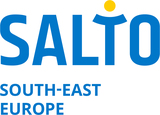Possibilities within the Erasmus + Programme in the field of youth with the Western Balkan region
Possibilities within the Erasmus + Programme in the field of youth with the Western Balkan region
The projects are primarily implemented in a consortium of partners from different countries The organisations from the Western Balkan region can be applicants only in Capacity Building in the field of youth, otherwise they can be partners in project proposals applied elsewhere. (See more information in the Erasmus+ Programme Guide).
- Mobility projects for young people - “Youth Exchanges”
Youth Exchanges are meetings of groups of young people from at least two different countries who gather for a short period to implement jointly a non-formal learning programme (a mix of workshops, exercises, debates, role-plays, simulations, outdoor activities, etc.) on a topic of their interest, seeking inspiration from the European Youth Goals. The learning period comprises a planning period before the application, preparation phase before as well as evaluation and follow-up after the exchange.
- Mobility projects for youth workers
Mobility projects for youth workers are professional development activities, which are are transnational or international learning mobility activities supporting the professional development of youth workers. They may include system development and outreach activities, which are complementary activities aiming at enhancing the impact of the mobility project on the field and preparatory visits, which aim to ensure high quality activities by facilitating and preparing administrative arrangements, building trust and understanding and setting-up a solid partnership between the organisations and people involved.
- Youth participation activities
Youth participation activities are non-formal learning activities revolving around active participation of young people. Such activities aim to enable young people to experience exchanges, cooperation, cultural and civic action. Supported activities should help the participants strengthen their personal, social, citizenship and digital competences and become active European citizens.
- Virtual Exchanges
Virtual exchanges projects consist of online people-to-people activities that promote intercultural dialogue and soft skills development. They make it possible for every young person to access high-quality international and cross-cultural non-formal education without physical mobility. Digital platforms represent a valuable tool in partially answering the global constraints on mobility caused by the COVID-19 pandemic. Virtual exchanges also help spreading European values.
- Cooperation partnerships
The primary goal of Cooperation Partnerships is to allow organisations to increase the quality and relevance of their activities, to develop and reinforce their networks of partners, to increase their capacity to operate jointly at transnational level, boosting internationalisation of their activities and through exchanging or developing new practices and methods as well as sharing and confronting ideas. They aim to support the development, transfer and/or implementation of innovative practices as well as the implementation of joint initiatives promoting cooperation, peer learning and exchanges of experience at European level. Results should be re-usable, transferable, up-scalable and, if possible, have a strong transdisciplinary dimension. Selected projects will be expected to share the results of their activities at local, regional, national level and transnational level.
- Capacity Building in the field of youth
Capacity-building projects are international cooperation projects based on multilateral partnerships between organisations active in the field of youth in Programme and third countries not associated to the Programme. They aim to support the international cooperation and policy dialogue in the field of youth and non-formal learning, as a driver of sustainable socio-economic development and well-being of youth organisations and young people. These projects should benefit primarily the third countries not associated to the Programme, such as the Western Balkan countries.
